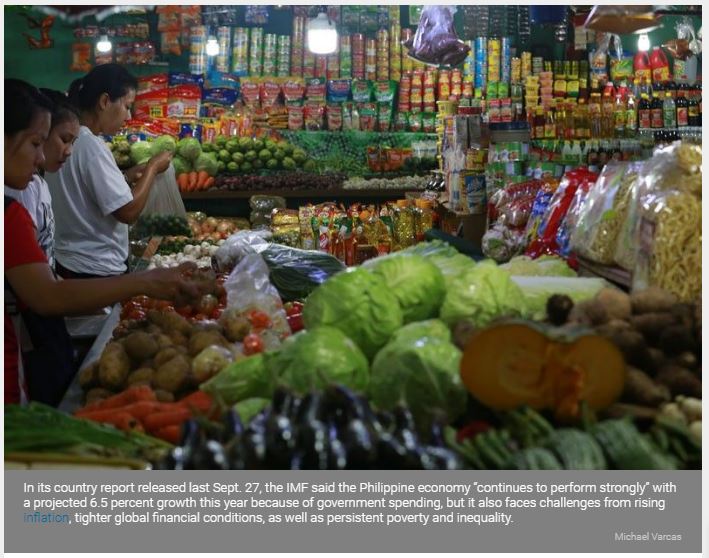Philippines: IMF to gov’t: Check inflation, sustain economic reforms
MANILA, Philippines — The International Monetary Fund (IMF) is urging the Duterte administration to address rising inflation and sustain economic reforms, including ensuring financial stability and opening sectors to competition, to reduce poverty and inequality.
In its country report released last Sept. 27, the IMF said the Philippine economy “continues to perform strongly” with a projected 6.5 percent growth this year because of government spending, but it also faces challenges from rising inflation, tighter global financial conditions, as well as persistent poverty and inequality.
“To ensure that growth benefits everyone, the government will need to strike the right balance between maintaining a strong and stable economy in an uncertain global environment, while continuing to prioritize reforms that raise living standards, such as targeted social spending and investing in infrastructure,” the IMF said.
“Improving people’s living standards in a sustainable manner requires deepening ongoing reforms – for instance, by increasing social spending – along with timely adjustments of macroeconomic policies to evolving domestic and external conditions,” it said.
It said tackling inflation should be a priority even as it cited efforts by the Bangko Sentral ng Pilipinas to tighten monetary policy and its readiness to employ more tools if needed to contain inflation and preserve market confidence.
The IMF said the Philippines needs to maintain the reform momentum to tackle high levels of poverty and inequality.
“To create more jobs, policymakers should continue prioritizing reforms that open new sectors of the economy to foreign investment and further improve competition and the business environment,” it said.
It said the government’s move to replace the rice import quota system with one based on tariffs would benefit consumers by reducing domestic rice prices, but this should be accompanied by protection of affected small farmers.
The IMF also suggested that the government should gradually expand social protection programs to reduce poverty, such as the conditional cash transfer program.
It noted that poverty is declining in the Philippines but at a slow pace.
The IMF also encourage the government to ramp up infrastructure spending to the level of its neighbors in the Southeast Asian region.
Raising revenues and reallocating spending from nonpriority programs can support the continued expansion of public investment and social spending and keeping a neutral fiscal stance for until next year would avoid overburdening monetary policy, it said.
“Public investment, if well managed and targeted, can help boost overall productivity, stimulate private investment, and reduce poverty by creating jobs. At the same time, public investment management should aim to maximize the return from large infrastructure projects, including through a more rigorous appraisal of projects and by fostering effective competition in procurement,” it said.
The IMF also cited the need for more investments in human and physical capital to help the Philippines reap the digital benefits even as it pushed for the strengthening of the country’s cyber security also needs to be strengthened to minimize the risk of cyber threats
Given the growing young population and the prospering business process outsourcing industry in the Philippines, emerging digital technologies create both opportunities and challenges to the economy.
“Improving education and training to better equip today’s job seekers, as well as investing more in digital infrastructure, like broadband technology, can help the Philippines fully reap the digital dividend and elevate the standing of the country’s outsourcing industry in the global economy,” the report said.
It said the government’s digital strategy, including the plan to put up a national broadband network, and the entry of a third telecom player, would also enable the country to take reap the benefits of digitalization.
Source: https://www.philstar.com/business/2018/10/02/1856376/imf-govt-check-inflation-sustain-economic-reforms#rmpP1fHK3bYr0pfD.99


 Thailand
Thailand




